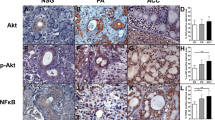Abstract
Objectives The current study examined the role of estrogen receptors (ER), progesterone receptors (PR) and p53 expression in adenoid cystic carcinoma (ACC) to determine if simple expression or possible overexpression of these products might influence the development and natural course of this cancer. Study Design ER and PR status and p53 overexpression were retrospectively evaluated utilizing immunohistochemical evaluation of 47 ACC specimens. Methods Formalin-fixed paraffin-embedded tissues from 47 ACC specimens and 47 samples of normal salivary gland tissue were evaluated histochemically for the presence of ER, PR and p53. Immunoreactivity was scored using a 0 to +3 scale in which staining was either (0) negative, (+1) spotty, (+2) weakly positive, or (+3) strongly positive. Results ER was expressed in 8 of 47 tumors while PR was expressed in 4 of 47 tumors. p53 aberrations were demonstrated in 26 of 47 tumors. Tumors showed varying degrees of immunopositivity ranging from 0 to +3. Conclusions These studies suggest that p53 aberrations may be involved in ACC tumor progression and that ER and PR may play a role in ACC development.




Similar content being viewed by others
References
Ro JY, Silva EG, Gallagher HS. Adenoid cystic carcinoma of the breast. Hum Pathol 1987;18:1216–81
Abrao FS, Marques AF, Marzinona F, et al. Adenoid cystic carcinoma of Bartholin’s gland: review of the literature and report of two cases. J Surg Oncol 1985;20:132–7
Berg JW, Hutter RV, Foote FW. The unique association between salivary gland cancer and breast cancer. JAMA 1968;204:771–4
Dimery IW, Jones LA, Verjan RP, et al. Estrogen receptors in normal salivary gland and salivary gland carcinoma. Arch Otolaryngol Head Neck Surg 1987;113:1082–5
Shick PC, Riordan P, Foss RD. Estrogen and progesterone receptors in salivary gland adenoid cystic carcinoma. Oral Surg Oral Med Oral Pathol 1995;80:440–4
Jones MA, Pritchard BA, Tarraza H. Immunohistochemical adenocarcinoma and correlation with clinicopathologic parameters [Abstract]. Am J Clin Pathol 1992;97:447
Bur M, Perlman C. Estrogen and progesterone receptor expression in tumors of the thyroid. Am J Clin Pathol 1991;96:409–10
Alford TC, Do H-M, Geelhoed GW, et al. Steroid hormone receptors in human colon cancer. Cancer 1979;43:980–4
Concolino G, Carocchi A, DiSilverio F, et al. Progestational therapy in human renal cell carcinoma and steroid receptors. J Steroid Biochem 1976;7:923–7
Bond GL, Levine AJ. A single nucleotide polymorphism in the p53 pathway interacts with gender, environmental stresses and tumor genetics to influence cancer in humans. Oncogene 2007:26;1317–23
Ruder AM, Lubin F, Yochanan W, et al. Estrogen and progesterone receptors in breast cancer patients: Epidemiologic characteristics and survival differences. Cancer 1989;64:196–202
Mirecki DM, Jordan VC. Steroid hormone receptors and human breast cancer. Lab Med 1985;16:287–94
Skiner LG, Barnes DM, Ribeiro GG. The clinical value of multiple steroid receptor assays in breast cancer management. Cancer 1980;46:2939–45
Ozono S, Onozuka M, Sato K, et al. Immunohistochemical localization of estradiol, progesterone, and progesterone receptor in human salivary glands and salivary adenoid cystic carcinomas. Cell Struct Funct 1992;17:169–75
Miller AS, Hartman GG, Chen SY, et al. Estrogen receptor assay in polymorphous low-grade adenocarcinoma and adenoid cystic carcinoma of salivary gland origin. Oral Surg Oral Med Oral Pathol 1994;77:36–40
Dori S, Trougouboff P, David R, et al. Immunohistochemical evaluation of estrogen and progesterone receptors in adenoid cystic carcinoma of salivary gland origin. Oral Oncol 2000;36:450–3
Trendell-Smith P, Shousha S. Adenoid cystic carcinoma of the breast: a tumor commonly devoid of estrogen receptors and related proteins. Histopathology 1999:35:241–8
Kiyoshima T, Shima K, Kobayashi I, et al. Expression of p53 tumor suppressor gene in adenoid cystic and mucoepidermoid carcinomas of the salivary glands. Oral Oncol 2001;37:315–22
Acknowledgements
This work was supported by a grant from the National Organization for Rare Disorders, Inc.
Author information
Authors and Affiliations
Corresponding author
Rights and permissions
About this article
Cite this article
Barrera, J.E., Shroyer, K.R., Said, S. et al. Estrogen and Progesterone Receptor and p53 Gene Expression in Adenoid Cystic Cancer. Head and Neck Pathol 2, 13–18 (2008). https://doi.org/10.1007/s12105-007-0032-3
Received:
Accepted:
Published:
Issue Date:
DOI: https://doi.org/10.1007/s12105-007-0032-3




